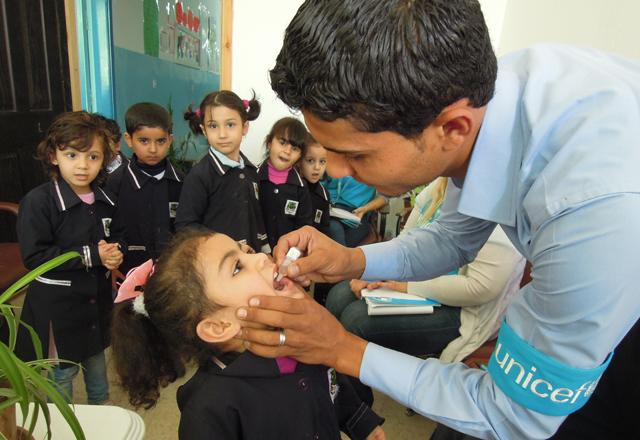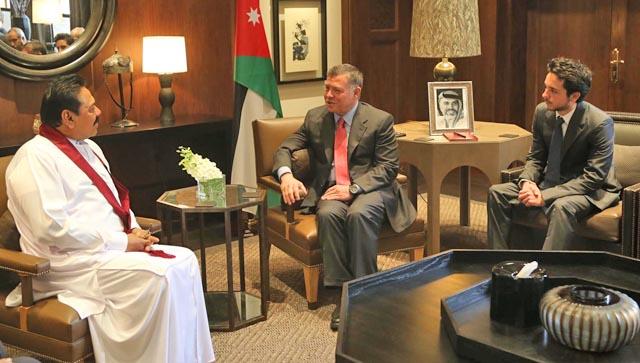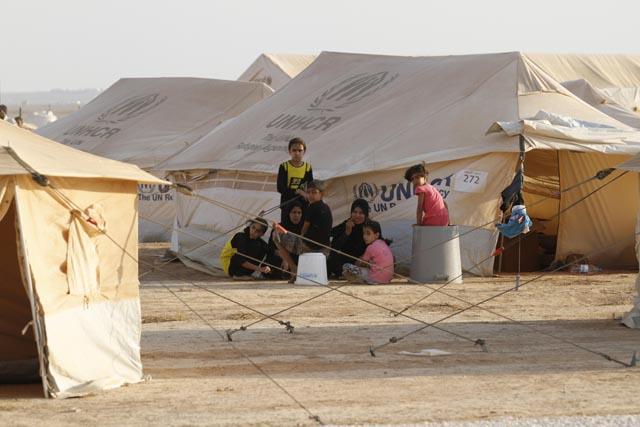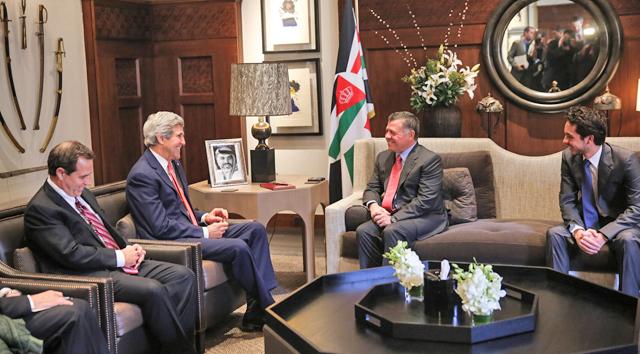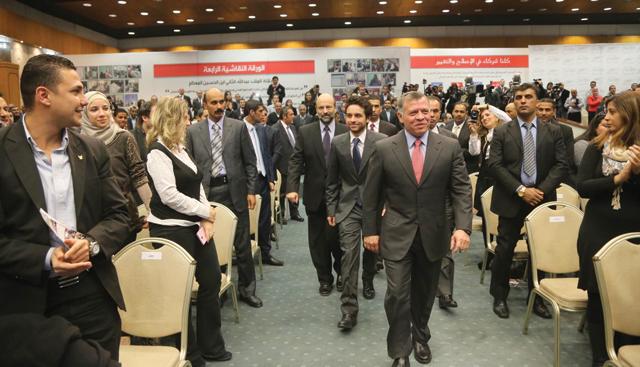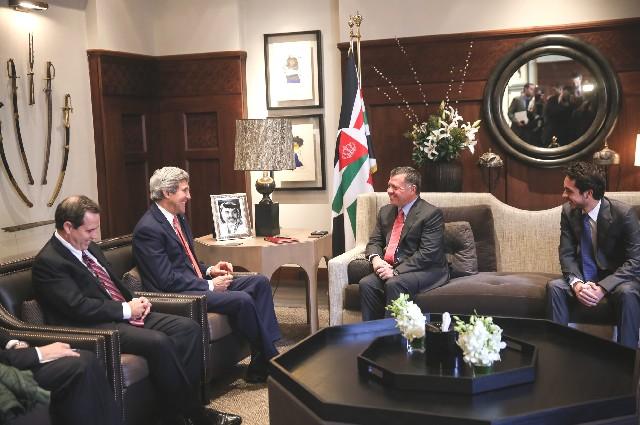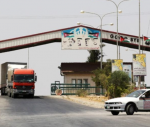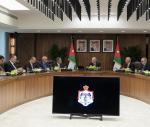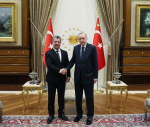AMMAN — His Majesty King Abdullah on Sunday held talks with US Secretary of State John Kerry that covered bilateral ties and the latest regional developments, with focus on the peace process and the Syrian crisis.
During the meeting, which was attended by HRH Crown Prince Hussein, the King reiterated Jordan’s support for peace efforts aimed at achieving a just and comprehensive solution to the Palestinian-Israeli conflict that guarantees the establishment of an independent Palestinian state within the pre-1967 lines with East Jerusalem as its capital, according to a Royal Court statement.
The Monarch also renewed Jordan’s unaltered support for the US-brokered peace negotiations between the Palestinians and the Israelis based on the 2002 Arab Peace Initiative and the international resolutions in a way that safeguards the Kingdom’s higher interests especially those concerning the final status issues, the statement said.
The King also renewed Jordan’s stance that calls for a comprehensive political solution to the Syrian crisis that can preserve its territorial unity and end the suffering of its people.
He underlined the burden undertaken by the resource-limited Kingdom as a result of hosting more than half a million Syrian refugees.
For his part, Kerry briefed the King on the efforts exerted to achieve progress in the Palestinian-Israeli peace talks, expressing gratitude for Jordan’s efforts in this regard and also to its humanitarian assistance to the Syrian refugees, according to the Royal Court.
Kerry also briefed the Monarch on the US’ efforts to hold the projected Geneva II peace conference on Syria, according to the statement.
The meeting was attended by Foreign Minister Nasser Judeh, and key officials and diplomats from both countries.
During a press conference in Jerusalem earlier in the day, Kerry, who left Amman for Saudi Arabia, rejected Israeli and Palestinian claims the US was biased, Agence France-Presse reported.
He promised any agreed plan would be “fair and balanced” and likened his efforts to broker a compromise between the conflicting demands of the two sides to a puzzle.
“In the end all of these core issues fit together like a mosaic, like a puzzle and you can’t separate out one piece or another,” Kerry said.
Each piece was interlinked, he stressed, and depended on the compromises the other side might be prepared to make.
“And there’s always tension as to when you put your card on the table as to which piece you’re willing to do, when and how,” said Kerry.
But he warned his efforts could ultimately fail, saying he could not tell when “the last pieces may decide to fall into place, or may fall on the floor, and leave the puzzle unfinished. That’s exactly what makes this such a challenge”.
On his talks in Jordan and Saudi Arabia, a senior State Department official was quoted by AFP as saying that Kerry wanted to “seek their counsel on the discussion with the Israelis and Palestinians about a framework for final status negotiations”.
He then flew to Saudi Arabia for talks with King Abdullah Bin Abdul Aziz at his desert residence outside Riyadh.
“Thank you so much for agreeing to see me on such short notice,” Kerry told the king after arriving on a short helicopter flight from the Riyadh airport, the agency reported.
Jordan borders the occupied West Bank and under its 1994 peace treaty with Israel is recognised as playing a historic role in the guardianship of Muslim sites in East Jerusalem.
Jordan has repeatedly said that final status issues lie at the core of its strategic national interests, which include the issues of Jerusalem, refugees, borders and water.
The Saudi king was the author of a 2002 Arab League Peace Initiative, which Kerry praised again Sunday as holding out the prospect for “instantaneously” reaching peace between Israel and “22 Arab nations and 35 Muslim nations, all of whom have said they will recognise Israel if peace is achieved”.
Kerry kick-started nine months of direct negotiations in July after a three-year hiatus. But Israeli and Palestinian officials have both traded accusations in recent days.
“The Palestinians are continuing their campaign of inciting hatred, as we have seen in the last few days with their refusal to recognise Israel as a state for the Jewish people,” Israeli Prime Minister Benjamin Netanyahu told his Cabinet on Sunday.
“This is the main issue that we’re discussing with [Kerry]. Among other key topics are Israel’s security, which must remain in its hands,” he added, in comments broadcast by public radio.
He was speaking after a Palestinian source said Washington was proposing a mixed Israeli-Palestinian military presence to ensure security in the area, without setting a deadline when the Israeli troops would be withdrawn.
But Kerry insisted: “I can guarantee all parties that President [Barack] Obama and I are committed to putting forward ideas that are fair, that are balanced, and that improve the security of all the people of this region.”
A peace treaty would deal with all core issues dividing the two sides, including the contours of a future Palestinian state, refugees, the fate of Jerusalem claimed by both as a capital, security and mutual recognition.
A Cabinet member close to Netanyahu said Sunday Israel rejects any US-proposed security concessions for the Jordan Valley, where the West Bank borders Jordan.
“Security must remain in our hands. Anyone who proposes a solution in the Jordan Valley by deploying an international force, Palestinian police or technological means... does not understand the Middle East,” said Intelligence Minister Yuval Steinitz.


